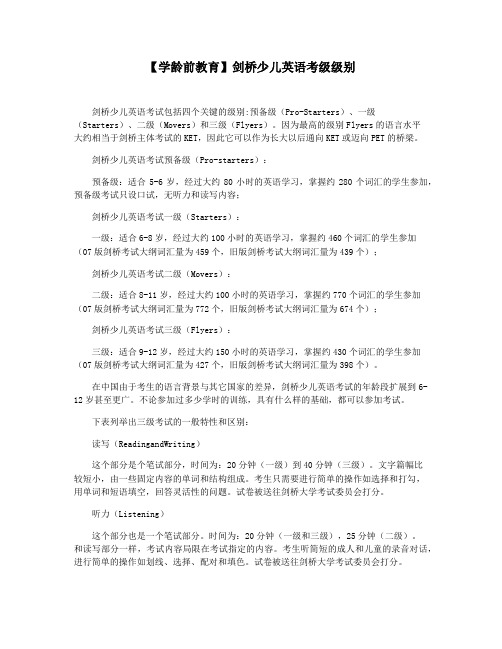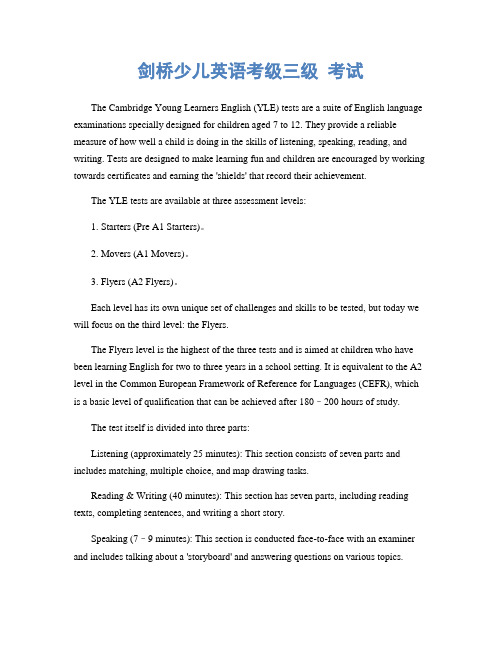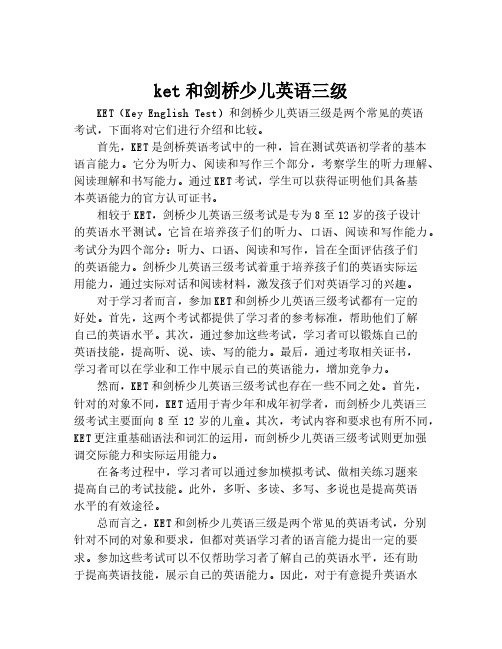剑桥少儿英语三级分数
【学龄前教育】剑桥少儿英语考级级别

【学龄前教育】剑桥少儿英语考级级别剑桥少儿英语考试包括四个关键的级别:预备级(Pro-Starters)、一级(Starters)、二级(Movers)和三级(Flyers)。
因为最高的级别Flyers的语言水平大约相当于剑桥主体考试的KET,因此它可以作为长大以后通向KET或迈向PET的桥梁。
剑桥少儿英语考试预备级(Pro-starters):预备级:适合5-6岁,经过大约80小时的英语学习,掌握约280个词汇的学生参加,预备级考试只设口试,无听力和读写内容;剑桥少儿英语考试一级(Starters):一级:适合6-8岁,经过大约100小时的英语学习,掌握约460个词汇的学生参加(07版剑桥考试大纲词汇量为459个,旧版剑桥考试大纲词汇量为439个);剑桥少儿英语考试二级(Movers):二级:适合8-11岁,经过大约100小时的英语学习,掌握约770个词汇的学生参加(07版剑桥考试大纲词汇量为772个,旧版剑桥考试大纲词汇量为674个);剑桥少儿英语考试三级(Flyers):三级:适合9-12岁,经过大约150小时的英语学习,掌握约430个词汇的学生参加(07版剑桥考试大纲词汇量为427个,旧版剑桥考试大纲词汇量为398个)。
在中国由于考生的语言背景与其它国家的差异,剑桥少儿英语考试的年龄段扩展到6-12岁甚至更广。
不论参加过多少学时的训练,具有什么样的基础,都可以参加考试。
下表列举出三级考试的一般特性和区别:读写(ReadingandWriting)这个部分是个笔试部分,时间为:20分钟(一级)到40分钟(三级)。
文字篇幅比较短小,由一些固定内容的单词和结构组成。
考生只需要进行简单的操作如选择和打勾,用单词和短语填空,回答灵活性的问题。
试卷被送往剑桥大学考试委员会打分。
听力(Listening)这个部分也是一个笔试部分。
时间为:20分钟(一级和三级),25分钟(二级)。
和读写部分一样,考试内容局限在考试指定的内容。
剑桥少儿英语考试级别描述及年龄要求

这篇关于剑桥少⼉英语考试级别描述及年龄要求,是特地为⼤家整理的,希望对⼤家有所帮助!
剑桥少⼉英语学习系统分为⼀级、⼆级、三级共三个级别。
⼀级:适合6-8岁,经过⼤约240学时的英语学习,掌握近400个词汇,能够简单描述家庭、学校、朋友、⾃⼰、体育运动和业余活动等主题,涉及年龄、外貌、颜⾊等概念。
⼆级:适合8-11岁,经过⼤约420学时的英语学习,掌握约600个词汇,具体描述的概念扩展到天⽓、健康、环境、动作、职责等。
三级:适合9-12岁,经过⼤约600学时的英语学习,掌握1000个词汇,能够运⽤学过的词汇讲述⾃⼰⽣活中的⼈和事,词汇量可达到教育部规定的初中毕业要求。
剑桥少儿英语考级三级 考试

剑桥少儿英语考级三级考试The Cambridge Young Learners English (YLE) tests are a suite of English language examinations specially designed for children aged 7 to 12. They provide a reliable measure of how well a child is doing in the skills of listening, speaking, reading, and writing. Tests are designed to make learning fun and children are encouraged by working towards certificates and earning the 'shields' that record their achievement.The YLE tests are available at three assessment levels:1. Starters (Pre A1 Starters)。
2. Movers (A1 Movers)。
3. Flyers (A2 Flyers)。
Each level has its own unique set of challenges and skills to be tested, but today we will focus on the third level: the Flyers.The Flyers level is the highest of the three tests and is aimed at children who have been learning English for two to three years in a school setting. It is equivalent to the A2 level in the Common European Framework of Reference for Languages (CEFR), which is a basic level of qualification that can be achieved after 180–200 hours of study.The test itself is divided into three parts:Listening (approximately 25 minutes): This section consists of seven parts and includes matching, multiple choice, and map drawing tasks.Reading & Writing (40 minutes): This section has seven parts, including reading texts, completing sentences, and writing a short story.Speaking (7–9 minutes): This section is conducted face-to-face with an examiner and includes talking about a 'storyboard' and answering questions on various topics.The Flyers test is designed to assess a child's ability to understand and use English in everyday situations. It is not merely a test of theoretical knowledge, but rather a demonstration of how well they can communicate in English.Preparing for the Flyers test involves a combination of classroom learning, homework, and practical experience in using English. Teachers often use games, songs, and stories to make the learning process enjoyable. Parents can also help at home by encouraging their children to read English books, watch English-language movies, and practice speaking in everyday situations.The Flyers test is an excellent way for children to gain confidence and improve their English. It is also a valuable qualification, as a good score in the Flyers test can be a stepping stone to more advanced examinations, such as the Key English Test (KET) and Preliminary English Test (PET), in the future.In conclusion, the Cambridge YLE Flyers test is a comprehensive and fun way for children to demonstrate their English language abilities. It encourages them to learn and use English in a natural and engaging way, setting a strong foundation for future language learning. 。
剑桥少儿英语三级考试作文评分标准

剑桥少儿英语三级考试作文评分标准Cambridge Young Learners English (YLE) is an internationally recognized English language assessment for young learners. The YLE exams are designed to assess the English language proficiency of children aged between 7 and 12 years old. In this article, we will discuss the assessment criteria for the YLE Level 3 Writing paper and provide tips on how to score well in this exam.The YLE Level 3 Writing paper consists of two parts: Part 1 and Part 2. In Part 1, candidates are required to write a short message or a postcard. In Part 2, candidates need to write a story or a description based on a picture prompt. Let's now explore the assessment criteria for each part in detail.In Part 1, candidates are assessed on their ability to convey a simple message or information. The following criteria are used to evaluate their performance:1. Content: Candidates should provide relevant information and address the task appropriately. The message should be clear and coherent.2. Vocabulary: Candidates should use a range of vocabulary appropriate for their level. They should demonstrate an understanding of basic vocabulary related to the topic.3. Grammar: Candidates should use correct grammatical structures and demonstrate an understanding of basic sentence formation.4. Spelling and punctuation: Candidates should demonstrate accurate spelling and punctuation.5. Organization: Candidates should organize their message in a logical and coherent manner. They should use appropriate paragraphing and linking words to connect ideas.In Part 2, candidates are assessed on their ability to write a story or a description based on a picture prompt. The following criteria are used to evaluate their performance:1. Content: Candidates should develop a clear and engaging story or description based on the picture prompt. The content should be relevant and well-developed.2. Vocabulary: Candidates should use a wide range of vocabulary appropriate for their level. They should demonstrate an understanding of descriptive language and use it effectively.3. Grammar: Candidates should use a variety of grammatical structures and demonstrate an understanding of sentence formation. They should use appropriate tenses, pronouns, and conjunctions.4. Spelling and punctuation: Candidates should demonstrate accurate spelling and punctuation.5. Organization: Candidates should organize their writing in a logical and coherent manner. They should use appropriate paragraphing and linking words to connect ideas.To score well in the YLE Level 3 Writing paper, candidates should focus on the following tips:1. Read the instructions carefully and make sure you understand the task.2. Plan your writing before you start. Think about the content and structure of your message, story, or description.3. Use a variety of vocabulary and sentence structures to make your writing more interesting.4. Check your spelling and punctuation carefully before submitting your final answer.5. Review your writing for coherence and organization. Make sure your ideas flow logically and are connected with appropriate linking words.In conclusion, the YLE Level 3 Writing paper assesses candidates' ability to convey a simple message and write a story or description. By focusing on the assessment criteria and following the tips provided, candidates can improve their performance in this exam. Good luck!。
剑桥少儿英语等级考试

剑桥少儿英语等级考试剑桥少儿英语等级考试是一种专为儿童设计的英语能力测评。
该考试由剑桥大学考试委员会(Cambridge Assessment)管理,并根据不同年龄和英语水平设置了不同级别的考试。
它的目的是帮助儿童提高和展示他们的英语能力,同时为教育机构和家长提供一个对儿童英语学习进展进行评估的标准。
剑桥少儿英语等级考试主要分为三个等级,分别为Starters(入门级)、Movers(初级)和Flyers(中级)。
这些等级的考试内容包括听力、口语、阅读和写作,其中口语是最重要的部分,它旨在评估儿童的口语交流能力。
考试的题型多样,包括选择题、填空题和简答题等,以帮助儿童全面发展他们的语言技能。
剑桥少儿英语等级考试的优势在于它注重培养儿童的语言运用能力。
通过参加该考试,儿童能够锻炼自己的听说读写能力,提高自己的语言表达和理解能力。
考试内容涉及生活、学校、家庭等日常生活话题,使儿童能够在实际生活中更好地运用所学的英语知识。
此外,剑桥少儿英语等级考试还有明确的标准和评分体系,使得考试结果更加客观和公正。
家长和教育机构可以根据考试成绩来评估儿童的英语水平,并为他们提供相应的学习建议和指导。
对于儿童来说,这个考试也是一种激励,他们可以通过参加考试来衡量自己的进步并获得奖励。
总之,剑桥少儿英语等级考试是一个有效的英语能力测评工具,可以帮助儿童提高和展示他们的英语技能。
它注重培养儿童的语言运用能力,通过多样的题型和实际生活话题,使儿童能够更好地运用所学的英语知识。
同时,考试结果也可以为教育机构和家长提供一个评估儿童英语学习进展的标准。
通过参加剑桥少儿英语等级考试,儿童可以激励自己并获得相应的奖励,从而更好地提高自己的英语能力。
剑桥少儿英语三级考试作文评分标准

剑桥少儿英语三级考试作文评分标准全文共3篇示例,供读者参考篇1Cambridge Young Learners English (YLE) Tests are designed for young learners whose first language is not English. The YLE tests are simple and enjoyable for children to take, as they cover key areas of English language learning in a fun andnon-threatening way. The tests are divided into three levels –Starters, Movers, and Flyers, each corresponding to different ability levels.For the Starters level, candidates are required to write a short story or description of around 30 words. They are assessed on their ability to communicate their ideas clearly and use a range of vocabulary and simple sentence structures. In addition, candidates are judged on their spelling and punctuation.For the Movers level, candidates are required to write a short story or description of around 50 words. They are assessed on their ability to communicate their ideas clearly and coherently, use a wider range of vocabulary and sentence structures, and demonstrate more accurate spelling and punctuation.For the Flyers level, candidates are required to write a short story or description of around 70 words. They are assessed on their ability to communicate ideas effectively and fluently, use a rich variety of vocabulary and sentence structures, show a good command of spelling and punctuation, and demonstrate a good level of creativity and imagination.In all levels of the YLE tests, candidates are also assessed on their ability to engage the reader and hold their interest, as well as their overall ability to write in an appropriate register for a young learner of English.Overall, candidates are graded on a scale of A, B, or C, with A being the highest grade and C being the lowest. The grading is based on the criteria mentioned above, with extra credit given for creativity, originality, and fluency of expression.In conclusion, the YLE writing test is an important component of the overall assessment, as it provides a valuable insight into the candidate's ability to communicate in English. By following the criteria and guidelines provided, candidates can improve their writing skills and achieve a higher grade in the Cambridge Young Learners English Tests.篇2Cambridge Young Learners English (YLE) is a series of fun and motivating English language tests, designed specifically for children. The tests are divided into three levels - Starters, Movers, and Flyers, with each test assessing different language skills in reading, writing, listening, and speaking.For the YLE Level 3 (Flyers) writing test, there are certain criteria that examiners use to evaluate the students’ performance. These criteria include content, organization, language accuracy, and writing skill. In order to achieve a high score in the writing test, students need to pay attention to the following aspects:1. Content: Students should make sure their writing addresses the topic given in the exam task. They should include relevant information and ideas, and express their opinions clearly. It is important to stay on topic and avoid irrelevant information.2. Organization: A well-structured piece of writing is essential for a good score. Students should use paragraphs to separate different ideas and make their writing easy to follow. They should also use appropriate linking words to connect their ideas and ensure a logical flow of information.3. Language accuracy: Students should demonstrate a good command of grammar and vocabulary throughout their writing.They need to use a variety of sentence structures, tenses, and vocabulary to show their language skills. Spelling and punctuation should also be accurate.4. Writing skill: Writing is a skill that can be developed with practice. It is important for students to practice writing regularly in order to improve their ability to organize their ideas, express themselves clearly, and use language accurately.In conclusion, in order to do well in the Cambridge YLE Level 3 (Flyers) writing test, students need to pay attention to their content, organization, language accuracy, and writing skill. By practicing regularly and focusing on these aspects, students can improve their writing and achieve a high score in the exam.篇3Cambridge Young Learners English (YLE) is a series of fun and engaging English language tests specially designed for young learners. The YLE tests are divided into three levels: Starters, Movers, and Flyers. This document will focus on the assessment criteria for the YLE Flyers exam, which is the third level in the series.Writing is one of the four skills tested in the YLE Flyers exam. In the writing section, candidates are required to complete twowriting tasks: a short message task and a story writing task. Each task is graded on a scale of 1 to 5, with 5 being the highest score.The following criteria are used to evaluate candidates' writing performance in the YLE Flyers exam:1. Task Achievement:- Has the candidate completed the task as required?- Has the candidate included all the necessary information in the short message task?- Has the candidate written a well-structured and coherent story in the story writing task?2. Vocabulary:- Has the candidate used a range of vocabulary appropriate to their level?- Has the candidate used words accurately in context?- Has the candidate demonstrated creativity in their choice of vocabulary?3. Grammar:- Has the candidate used a variety of grammatical structures?- Has the candidate used correct grammar throughout their writing?- Has the candidate demonstrated an understanding of basic grammar rules?4. Spelling and Punctuation:- Has the candidate spelled words correctly?- Has the candidate used appropriate punctuation marks?- Has the candidate demonstrated control over spelling and punctuation?5. Organization and Cohesion:- Has the candidate organized their ideas logically?- Has the candidate used appropriate linking words to connect ideas?- Is the writing clear and easy to follow?Each of these criteria plays an important role in determining a candidate's overall score in the writing section of the YLE Flyers exam. By carefully considering these criteria, examiners are able to assess candidates' writing skills accurately and fairly.In conclusion, the YLE Flyers writing assessment criteria focus on evaluating candidates' ability to complete writing tasks successfully, use appropriate vocabulary and grammar, demonstrate control over spelling and punctuation, and organize their ideas cohesively. By understanding and applying these criteria, candidates can improve their writing skills and increase their chances of achieving a high score in the YLE Flyers exam. Good luck to all the young learners preparing for the YLE Flyers exam!。
ket和剑桥少儿英语三级

ket和剑桥少儿英语三级KET(Key English Test)和剑桥少儿英语三级是两个常见的英语考试,下面将对它们进行介绍和比较。
首先,KET是剑桥英语考试中的一种,旨在测试英语初学者的基本语言能力。
它分为听力、阅读和写作三个部分,考察学生的听力理解、阅读理解和书写能力。
通过KET考试,学生可以获得证明他们具备基本英语能力的官方认可证书。
相较于KET,剑桥少儿英语三级考试是专为8至12岁的孩子设计的英语水平测试。
它旨在培养孩子们的听力、口语、阅读和写作能力。
考试分为四个部分:听力、口语、阅读和写作,旨在全面评估孩子们的英语能力。
剑桥少儿英语三级考试着重于培养孩子们的英语实际运用能力,通过实际对话和阅读材料,激发孩子们对英语学习的兴趣。
对于学习者而言,参加KET和剑桥少儿英语三级考试都有一定的好处。
首先,这两个考试都提供了学习者的参考标准,帮助他们了解自己的英语水平。
其次,通过参加这些考试,学习者可以锻炼自己的英语技能,提高听、说、读、写的能力。
最后,通过考取相关证书,学习者可以在学业和工作中展示自己的英语能力,增加竞争力。
然而,KET和剑桥少儿英语三级考试也存在一些不同之处。
首先,针对的对象不同,KET适用于青少年和成年初学者,而剑桥少儿英语三级考试主要面向8至12岁的儿童。
其次,考试内容和要求也有所不同,KET更注重基础语法和词汇的运用,而剑桥少儿英语三级考试则更加强调交际能力和实际运用能力。
在备考过程中,学习者可以通过参加模拟考试、做相关练习题来提高自己的考试技能。
此外,多听、多读、多写、多说也是提高英语水平的有效途径。
总而言之,KET和剑桥少儿英语三级是两个常见的英语考试,分别针对不同的对象和要求,但都对英语学习者的语言能力提出一定的要求。
参加这些考试可以不仅帮助学习者了解自己的英语水平,还有助于提高英语技能,展示自己的英语能力。
因此,对于有意提升英语水平的学习者来说,参加KET和剑桥少儿英语三级考试是一个不错的选择。
《剑桥少儿英语》权威介绍

什么是YLE?剑桥少儿英语考试(Cambridge Young Learners English Tests)是剑桥大学外语考试部特别为测试7-12岁少儿的英语水平而设计的一套考试系统。
该考试分为三个级别:一级(Starters), 二级(Movers)和三级(Flyers)(考试英文名字喻示着孩子们从刚刚起步到渐渐前进直至最终起飞来学习掌握和使用英语)。
该系列考试能为今后参加剑桥通用英语五级系列考试(MSE)打下坚实的基础。
剑桥少儿英语考试的设计考虑到了若干领域的相关研究和考试使用者(儿童、家长和老师)的特殊需求。
充分地考虑到对儿童运用语言考试的教育因果关系和以下相关因素:当前少儿英语教学课程设计和教学的实际,包括当前教科书和其它教学材料儿童的认知水平和第一语言的形成发展考试方法,包括熟悉程度和考试内容,形式,印刷和分布的潜在影响在不同的第一语言和文化背景的人群的可能的差异总而言之,剑桥少儿英语考试对于儿童的语言学习来说,是一个积极的经历。
本套考试在标准上和剑桥其他考试一样具有准确性、可靠性和真实性。
它是建立在儿童所熟悉的日常活动和语言环境的基础上的。
考试的设计连不熟悉考试的孩子也一样很容易理解。
因为最高的三级所对应的语言水平是剑桥通用英语系列考试的第一级别(KET),所以本考试提供了迈向更高级的剑桥考试的机会。
剑桥大学的教师培训学院(Homerton College)对于剑桥少儿英语考试的发展起到了非常积极的作用,考试开发人员充分地利用了Homerton学院的研究及他们儿童教育的工作经验。
目前,参加剑桥少儿英语考试的儿童遍及55个国家和地区,考生人数逐年递增。
YLE的级别剑桥少儿英语考试的目标是:培养学生运用相关的、有意义的英语语言准确和公正的测量语言水平展示国际化考试的标准有效地影响语言的学习和教授剑桥少儿英语考试包括三个级别:一级(Starters):适合6-8岁,经过大约100小时的英语学习,掌握近400个词汇的学生参加;二级(Movers):适合8-11岁,经过大约175小时的英语学习,掌握约600个词汇的学生参加;三级(Flyers):适合9-12岁,经过大约250小时的英语学习,掌握约1000个词汇的学生参加注意:考试没有严格顺序,考生可以在12岁的时候参加一级的考试,或在7岁的时候参加三级的考试。
- 1、下载文档前请自行甄别文档内容的完整性,平台不提供额外的编辑、内容补充、找答案等附加服务。
- 2、"仅部分预览"的文档,不可在线预览部分如存在完整性等问题,可反馈申请退款(可完整预览的文档不适用该条件!)。
- 3、如文档侵犯您的权益,请联系客服反馈,我们会尽快为您处理(人工客服工作时间:9:00-18:30)。
剑桥少儿英语三级分数
剑桥少儿英语三级考试是一个重要的英语水平评估工具,通常用
来测试学生在听、说、读、写等方面的能力。
本次测验是针对年龄在8至11岁之间的学生而设计的,旨在帮助他们全面提高英语水平,为未
来的英语学习打下坚实的基础。
剑桥少儿英语三级考试主要包括四个部分:听力、口语、阅读和
书写。
每个部分都有不同的要求,测试学生在不同方面的英语技能。
以下是对每个部分的详细解读:
听力(Listening):这一部分主要测试学生听力理解能力。
学生
会听到一段对话或短文,然后回答相关问题或完成相应任务。
对于这
部分的准备,学生需要多听英语音频,提高对于英语语音和语调的理
解力。
同时,他们还需要练习注意力,培养捕捉关键信息的能力。
口语(Speaking):这一部分主要测试学生的口语表达能力。
学
生需要准备一些简单的自我介绍和回答问题的技巧。
同时,他们还需
要积极参与课堂口语练习,勇于开口,提高自信心。
此外,多与英语
母语者练习口语对话也是很有帮助的。
阅读(Reading):这一部分主要测试学生的阅读理解能力。
学生
会读到一些短文或者句子,然后回答相应的问题。
为了准备这一部分,学生需要扩大词汇量,提高词义辨析能力,并学会提取关键信息的技巧。
阅读英语故事书、报纸、杂志等都是很好的准备方式。
书写(Writing):这一部分主要测试学生的书写和表达能力。
学
生需要根据题目要求进行写作,如写信、日记、故事等。
为了准备这
一部分,学生需要积累常用词汇和短语,并熟练掌握常用句型和语法。
同时,他们需要多进行书写练习,提高写作速度和准确性。
除了针对每个部分的具体准备,学生还应该培养良好的学习习惯
和方法。
比如,他们可以制定合理的学习计划,合理分配时间和精力。
他们可以利用课余时间多进行英语听力和阅读,如听英语歌曲、看英
语电影等。
此外,多进行线上英语学习,并与其他学生进行英语对话
也是很有效的学习方式。
剑桥少儿英语三级考试对学生的英语学习起到了很大的推动作用。
准备此考试的过程中,学生需要全面提高听、说、读、写四个方面的
英语能力。
相信通过充分的准备和努力,学生们一定能够成功完成这
一考试,取得优异的成绩。
而这样的成绩将鼓励他们更进一步,提高
英语水平,开拓更广阔的国际交流空间。
